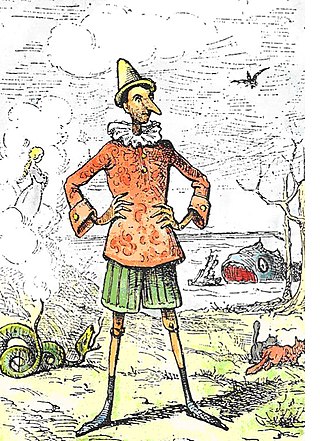Related Research Articles
Perjury is the intentional act of swearing a false oath or falsifying an affirmation to tell the truth, whether spoken or in writing, concerning matters material to an official proceeding.

A lie is an assertion that is believed to be false, typically used with the purpose of deceiving or misleading someone. The practice of communicating lies is called lying. A person who communicates a lie may be termed a liar. Lies can be interpreted as deliberately false statements or misleading statements, though not all statements that are literally false are considered lies – metaphors, hyperboles, and other figurative rhetoric are not intended to mislead, while lies are explicitly meant for literal interpretation by their audience. Lies may also serve a variety of instrumental, interpersonal, or psychological functions for the individuals who use them.
In criminal law, property is obtained by false pretenses when the acquisition results from the intentional misrepresentation of a past or existing fact.
False arrest, unlawful arrest or wrongful arrest is a common law tort, where a plaintiff alleges they were held in custody without probable cause, or without an order issued by a court of competent jurisdiction. Although it is possible to sue law enforcement officials for false arrest, the usual defendants in such cases are private security firms.
Misinformation is incorrect or misleading information. It differs from disinformation, which is deliberately deceptive and propagated information. Early definitions of misinformation focused on statements that were patently false, incorrect, or not factual. Therefore, a narrow definition of misinformation refers to the information's quality, whether inaccurate, incomplete, or false. However, recent studies define misinformation per deception rather than informational accuracy because misinformation can include falsehoods, selective truths, and half-truths.
In common law jurisdictions, a misrepresentation is a false or misleading statement of fact made during negotiations by one party to another, the statement then inducing that other party to enter into a contract. The misled party may normally rescind the contract, and sometimes may be awarded damages as well.

An accounting irregularity is an entry or statement that does not conform to the normal laws, practises and rules of the accounting profession, having the deliberate intent to deceive or defraud. Accounting irregularities can consist of intentionally misstating amounts and other information in financial statements, or omitting information required to be disclosed. Financial misstatements would cause huge losses for investors. More irregularities are found in companies with higher incentives. Accounting irregularities are often committed as a means to an end. For example, assets misappropriations may be concealed by using irregular accounting entries and profit overstatements may inflate the year end bonuses to offender. Offender may falsify the company performance to conceal low productivity and enhanced stock price. Accounting irregularities are commonly distinguished from unintentional mistakes or errors. The misstatements could cause significant concern about the quality of the firm's financial reports.

Derry v Peek [1889] UKHL 1 is a case on English contract law, fraudulent misstatement, and the tort of deceit.
In United States patent law, inequitable conduct is a breach of the applicant's duty of candor and good faith during patent prosecution or similar proceedings by misrepresenting or omitting material information with the specific intent to deceive the United States Patent and Trademark Office. A claim of inequitable conduct is a defense to allegations of patent infringement. Even in an instance when a valid patent suffers infringement, a court ruling on an allegation of infringement may exercise its power of equitable discretion not to enforce the patent if the patentee has engaged in inequitable conduct.
Making false statements is the common name for the United States federal process crime laid out in Section 1001 of Title 18 of the United States Code, which generally prohibits knowingly and willfully making false or fraudulent statements, or concealing information, in "any matter within the jurisdiction" of the federal government of the United States, even by merely denying guilt when asked by a federal agent. A number of notable people have been convicted under the section, including Martha Stewart, Rod Blagojevich, Michael T. Flynn, Rick Gates, Scooter Libby, Bernard Madoff, and Jeffrey Skilling.
Perjury is the name of an offence under the Criminal Code. The offence of false evidence under the Penal Code is equivalent.
In United States constitutional law, false statements of fact are assertions, which are ostensibly facts, that are false. Such statements are not always protected by the First Amendment. Often, this is due to laws against defamation, that is making statements that harm the reputation of another. In those cases, freedom of speech comes into conflict with the right to privacy. Because it is almost impossible for someone to be absolutely sure that what they say is true, a party who makes a false claim isn't always liable. Whether such speech is protected depends on the situation. The standards of such protection have evolved over time from a body of Supreme Court rulings.

United States v. Snider, 502 F.2d 645 (1972) was a case before the United States Court of Appeals for the Fourth Circuit. It was a consolidation of two separate cases: the first was a conviction for violation of 26 U.S.C. §7205, which prohibits submitting fraudulent tax information to an employer. The second was a conviction for violation of 18 U.S.C. §401, which prohibits "misbehavior ... as to obstruct the administration of justice."
Walker Process Equipment, Inc. v. Food Machinery & Chemical Corp., 382 U.S. 172 (1965), was a 1965 decision of the United States Supreme Court that held, for the first time, that enforcement of a fraudulently procured patent violated the antitrust laws and provided a basis for a claim of treble damages if it caused a substantial anticompetitive effect.
Internet manipulation is the co-optation of online digital technologies, including algorithms, social bots, and automated scripts, for commercial, social, military, or political purposes. Internet and social media manipulation are the prime vehicles for spreading disinformation due to the importance of digital platforms for media consumption and everyday communication. When employed for political purposes, internet manipulation may be used to steer public opinion, polarise citizens, circulate conspiracy theories, and silence political dissidents. Internet manipulation can also be done for profit, for instance, to harm corporate or political adversaries and improve brand reputation. Internet manipulation is sometimes also used to describe the selective enforcement of Internet censorship or selective violations of net neutrality.
Selling counterfeit illegal drugs is a crime in many U.S. states' legal codes and in the federal law of the United States. The fake drugs are sometimes termed as imitation controlled substances.
Lorenzo v. Securities and Exchange Commission, 587 U.S. ___ (2019), was a United States Supreme Court case from the October 2018 term.
Disinformation attacks are strategic deception campaigns involving media manipulation and internet manipulation, to disseminate misleading information, aiming to confuse, paralyze, and polarize an audience. Disinformation can be considered an attack when it occurs as an adversarial narrative campaign that weaponizes multiple rhetorical strategies and forms of knowing—including not only falsehoods but also truths, half-truths, and value-laden judgements—to exploit and amplify identity-driven controversies. Disinformation attacks use media manipulation to target broadcast media like state-sponsored TV channels and radios. Due to the increasing use of internet manipulation on social media, they can be considered a cyber threat. Digital tools such as bots, algorithms, and AI technology, along with human agents including influencers, spread and amplify disinformation to micro-target populations on online platforms like Instagram, Twitter, Google, Facebook, and YouTube.
Misinformation related to immunization and the use of vaccines circulates in mass media and social media in spite of the fact that there is no serious hesitancy or debate within mainstream medical and scientific circles about the benefits of vaccination. Unsubstantiated safety concerns related to vaccines are often presented on the internet as being scientific information. A high proportion of internet sources on the topic are "inaccurate on the whole" which can lead people searching for information to form "significant misconceptions about vaccines".
A truth sandwich is a technique in journalism to cover stories involving misinformation without unintentionally furthering the spread of false or misleading clams. It entails presenting the truth about a subject before covering misinformation, then ending a story by again presenting truth. Margaret Sullivan summarized it as "reality, spin, reality — all in one tasty, democracy-nourishing meal".
References
- ↑ Strader, Kelly J. Understanding White Collar Crime (2 ed.).
- ↑ Hubbard v. United States, 514 U.S. 695 (1995)
- ↑ United States v. Gilliland ,312US86, 93-94(1941)("Legislation had been sought by the Secretary of the Interior to aid the enforcement of laws relating to the functions of the Department of the Interior and, in particular, to the enforcement of regulations under Sec. 9(c) of the [NIRA].").
- ↑ 18 U.S.C. § 1001